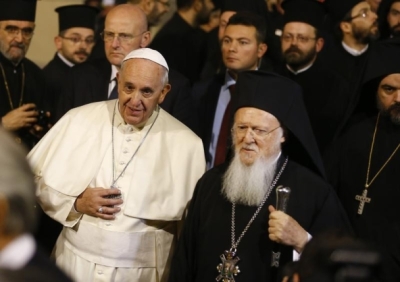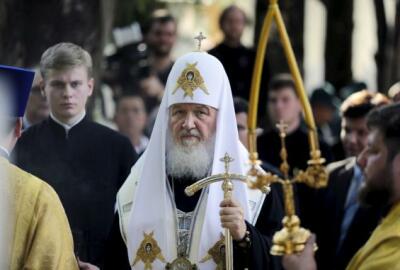Orthodox Christian church holds first great council in 1,229 years despite Russia's absence
The Orthodox Christian church is holding its first Holy and Great Council for the first time since 787 AD despite the delegations from Antioch, Russia, Georgia, and Bulgaria not participating.

"This great and holy council will carry the message of unity," Patriarch Vartholomaios of Crete said, as quoted by The Independent. "It will help to escape the deadlocks of the present."
According to the report, the full meeting, which took 55 years to plan, opened on Sunday in Crete, Greece, the purpose of which is to discuss the church's place in these modern times as well as to unite its different branches. Ecumenical Patriarch Bartholomew I, the Archbishop of Constantinople and the primus inter pares (first among equals), also said that the meeting aims to tackle fasting and other issues, such as its relationship with other religions, including the Roman Catholic Church.
It is supposed to be a meeting of leaders and representatives from self-governing Orthodox churches, but four decided not to participate. A dispute with the church's Jerusalem branch on who should be in charge of the church's contingent in Qatar has reportedly prompted the Antioch branch to not take part in the meeting. Also, disagreements on topics and logistics are said to have been the Bulgarian delegation's reasons for not joining. This was subsequently followed by Georgia's and Russia's decision to withdraw.
"We have made a decision that we will not be able to take part in the all-Orthodox synod if other churches do not go," Russian bishop Hilarion Alfeyev said. "All churches should take part ... and only in this case the decisions of the assembly will be legitimate."
According to Christian Today, at least 1,000 Orthodox scholars called for the meeting to push through despite the non-participation of some branches.
"We believe that there are no insurmountable difficulties to beginning the Council in June, despite the significant questions that have been raised regarding the drafts of the conciliar documents and conciliar proceedings," Christian Today quotes a letter as saying. "Nobody can expect the Council to settle all important questions and to heal all jurisdictional disputes in 10 days. But we hope that this Council will be a beginning of the healing process and that it will usher in a new era of global conciliarity and unity."

Russia's decision to not participate initially raised concerns on whether or not the meeting would push through, considering it is composed of around 43 percent of all Orthodox Christians. It has roughly 130 million members out of the worldwide estimate of 300 million, and it's leader Patriarch Kirill is considered as the second most powerful Orthodox see. There have been speculations that Kirill wishes to strengthen his own position by allegedly undermining Bartholomew. Observers have surmised that there is what a Russian newspaper called a "simmering religious war."
According to The Economist, Ukrainian politicians voted to ask Bartholomew to have a "unification council" and establish an independent Orthodox church in Ukraine, which would potentially mean that it would become independent of Russia. Kirill had reportedly warned Bartholomew that trying to detach the Ukraine branch from Russia would have a devastating effect on the relationship between them -- Constantinople's and Russia's church leaders.
 Christians don't have to affirm transgenderism, but they can’t express that view at work: tribunal
Christians don't have to affirm transgenderism, but they can’t express that view at work: tribunal Archaeology discovery: Medieval Christian prayer beads found on Holy Island
Archaeology discovery: Medieval Christian prayer beads found on Holy Island Presbyterian Church in America votes to leave National Association of Evangelicals
Presbyterian Church in America votes to leave National Association of Evangelicals Over 50 killed in 'vile and satanic' attack at Nigerian church on Pentecost Sunday
Over 50 killed in 'vile and satanic' attack at Nigerian church on Pentecost Sunday Ukrainian Orthodox Church severs ties with Moscow over Patriarch Kirill's support for Putin's war
Ukrainian Orthodox Church severs ties with Moscow over Patriarch Kirill's support for Putin's war Islamic State kills 20 Nigerian Christians as revenge for US airstrike
Islamic State kills 20 Nigerian Christians as revenge for US airstrike Man who served 33 years in prison for murder leads inmates to Christ
Man who served 33 years in prison for murder leads inmates to Christ


 Nigerian student beaten to death, body burned over ‘blasphemous’ WhatsApp message
Nigerian student beaten to death, body burned over ‘blasphemous’ WhatsApp message 'A new low': World reacts after Hong Kong arrests 90-year-old Cardinal Joseph Zen
'A new low': World reacts after Hong Kong arrests 90-year-old Cardinal Joseph Zen Iran sentences Christian man to 10 years in prison for hosting house church worship gathering
Iran sentences Christian man to 10 years in prison for hosting house church worship gathering French Guyana: Pastor shot dead, church set on fire after meeting delegation of Evangelicals
French Guyana: Pastor shot dead, church set on fire after meeting delegation of Evangelicals ‘Talking Jesus’ report finds only 6% of UK adults identify as practicing Christians
‘Talking Jesus’ report finds only 6% of UK adults identify as practicing Christians Mission Eurasia ministry center blown up in Ukraine, hundreds of Bibles destroyed: 'God will provide'
Mission Eurasia ministry center blown up in Ukraine, hundreds of Bibles destroyed: 'God will provide' Church holds service for first time after ISIS desecrated it 8 years ago
Church holds service for first time after ISIS desecrated it 8 years ago Burger King apologizes for 'offensive campaign' using Jesus' words at the Last Supper
Burger King apologizes for 'offensive campaign' using Jesus' words at the Last Supper Uganda: Muslims abduct teacher, burn him inside mosque for praying in Christ’s name
Uganda: Muslims abduct teacher, burn him inside mosque for praying in Christ’s name